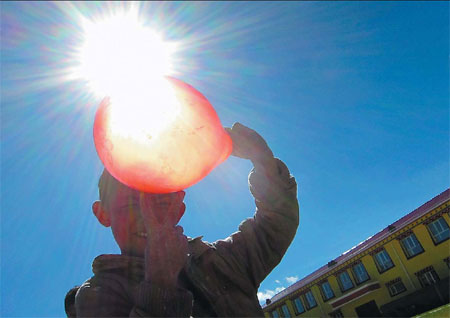Nomads embrace changes brought by education
Updated: 2014-04-08 07:08
By Erik Nilsson (China Daily USA)
|
|||||||||
Remote townships have been reaping the rewards of increased government funding and aid donated by China-based expats, including China Daily journalists, such as Erik Nilsson, a volunteer for a nonprofit organization called StepUp!, who reports from Yushu prefecture, Qinghai province.
Long ago, the nomads of Yege township in Qinghai province were noted for drinking and cutting each other with swords. But the aim was not to maim or kill. The reason was honor - the illiterate nomads settled their disputes with swords, not words.
Although the townspeople still regularly carry blades, the practice has been discontinued and the pen - or more accurately, the keyboard - is now mightier than the sword, according to Resang, the head of the township.
"The people fought because they lacked education," said Resang, who in common with many members of the Tibetan ethnic group only has one name.
"Things have gotten much quieter as more kids enter school. They educate their parents. The more the students learn in school, the more everyone does the right thing," he added.
Having said that, when I found myself in a dispute over a 10-yuan ($1.60) fare with a cab driver in Yushu, the relatively developed prefectural seat, a few days later, one glance at the blade he carried was enough to convince me to pay up without further argument. In fact, just to play it safe, I gave him 20 yuan.
That was the day after a Yege resident had shown me his sword, which he swore he had never used.
However, beyond the blades, Yege's transformation has been truly cutting-edge.
When I first visited the area in 2011, the 76 students at the primary school slept on boards in the seven tents that served as dorms, but when I made a return visit in July last year I discovered that a new brick dorm had been built to house the student population of 65, who sleep six to a room.
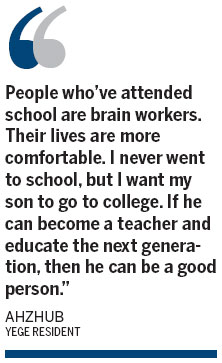
That wasn't the only development: The township now boasts a new classroom - the old one was damaged in a magnitude-7 earthquake in 2010 - a clinic, a meeting and performance hall, a latrine, and a monastery, all in close proximity to modern housing.
The transformation is the result of increased investment by the local government and aid provided by StepUp.
I first came to Yege with StepUp to help bring electricity to the kids' tents. Only 5 percent of local households had power at the time. The township is too remote to be connected to the main grid, so all the electricity is generated by solar panels.
In 2011, StepUp installed two solar panels, which provided enough electricity to power the entire school.
Now, every permanent dwelling in Yege has electricity and government-provided TV sets that offer a wide range of channels.
"Some wealthy people even have fridges and washing machines," township head Resang said.
Yege's changes - both physical and psychological - have mostly emanated from the school. The nomads, who previously believed their children were better off guiding yaks than studying, have made the campus the heart of the 150-house settlement.
"Now, the herders come to the school to ask about their kids' performance," said Tseringben, a teacher.
The government has built free housing around the campus, and also in Qumalai, the county seat, 97 kilometers from Yege.
Now, 90 to 95 percent of Yege's kids attend school. "Some families still think studying isn't an option because herding feeds the household," said Tseringjia, another teacher.
A simple question
The rise in student numbers came about after a visit made by educators in 2008: they traveled across the vast grassland and visited every tent they could see. They convinced the parents of the value of education by holding up 100-yuan bills and bottles of iced tea. When the illiterate parents admitted they couldn't identify the contents of the bottles or read the denominations of the banknotes, the educators asked a simple question: "Do you want your children to be able to?" That changed everything.
"I'm nomadic but, after talking to the teachers, I realized that education is important," said a local resident called Ahzhub.
"We tell our son: 'We work hard, herd and eat food from the high mountains every day, rain or snow. We do it so you can be educated. You know how hard our lives are. You should study hard'," said the 54-year-old, adding that he's pleased by the "huge changes". "We'd heard of many things like computers and the English language, but we hadn't seen them. Now, these things have come."
Ahzhub recalled that when his 13-year-old son, Chenlee Shira, sang the alphabet in English at a school performance, a nearby family offered a yak to help with "the financial burden".
"The pronunciation of A, B, C, D sounds like 'My father has a bad leg' in our dialect. When the people heard Chenlee Shira sing the English alphabet, they thought it was a plea for charity in Tibetan," said Ahzhub.
"He learned about computers quickly. He can download and store images," said the proud father, who, although delighted with his son's technological prowess, admitted that he doesn't know what the words "download" or "store images" mean.
Ahzhub and his wife spend the warmer months in a tent in the mountains across from the school. Although there is no road, the family camps close enough for the boy to return at the weekends.
Two-story brick houses are also taking shape beside the campus. Just a few years ago, most of the dwellings in Yege were crumbling adobe hovels, but now some of the mud structures near the school are being cleared to make room for the settlement's first kindergarten, which is expected to open in September.
Yege's population is more than 90 percent nomadic, the only exceptions being a handful of teachers and officials. The herders roam with tents most of the year but hunker down in permanent lodgings during the fierce winter months. Because the altitude averages 4,300 meters, the area is covered by snow 10 months of the year and in winter the temperature plummets to -25 C.
Public facilities
The increased government investment has not only built houses, but also provided public facilities.
Last year, a roofed latrine on stilts was constructed next to the school. The concrete slots spill into a dump brimming with yak bones and instant noodle packets, and, somewhat incongruously, an abandoned bed frame.
The townspeople previously relieved themselves in the open air, and the students had no option but to defecate in an open trash pile near the town's edge, while yaks nosed through the garbage.
However, the children don't use the latrine at night because feral mastiff dogs prowl the dark, along with wolves and bears lured by the kitchen waste in the pit.
"The new buildings are a huge change," Tseringben said. "Our town looks so different, but it's like skin without meat. The school buildings are finished, but the government says they're not up to standard. They must be renovated. The other buildings were damaged by the quake, but they aren't so dangerous."
The school's two multimedia labs remained unequipped until StepUp installed several computers last summer. The government later provided a further 50 machines.

But while rooms are adequate and the number of computers has grown, the area lacks qualified teachers.
The teachers raise the children: They cut their hair and even wipe their noses, which drip constantly because of the yearlong cold. In July, when the water is warm enough, they take the kids to the river to bathe.
Now, the first water pipes are being laid in Yege, although it's far too cold to bathe or wash clothes from August to June.
"Some of the instructors teach all subjects, including those they don't really know," Tseringben said. "We're stretched too thin and that affects the students. Some teachers didn't graduate from college and they don't understand pedagogy."
Indeed, some of the teachers finished their education after graduating from middle school. For example, most of them are unable to use PowerPoint presentations, Tseringben said. He added that although they have been learning more about them since the computers arrived, the main challenge is finding time to practice.
Sixth-grader Renzembdorlgyee believes computers will help counterbalance the teacher shortage. "The computers and projector will teach us more than before, especially Chinese," said the 16-year-old, who dreams of becoming a scientist, even though the school is unable to offer science classes.
That's where computers can help, he said.
Technology is key to providing a decent level of education for Yege's kids, according to a former teacher called Jiaxi Dawa. "The biggest changes are the laptops, iPads and projectors," he said. "They have revolutionized education. Computers show the kids the outside world - things they'd never imagined."
Two years ago, the school had one computer - now broken - and a tablet donated by StepUp.
Last year, the nonprofit organization donated five computers, an iPad mini, two e-book readers and a projector. Now, the school authorities are attempting to work out the logistics of training about 200 children in basic skills, from typing to surfing the Web, with so few devices.
'Magic paper'
However, the situation is a huge improvement from just a few years ago when nobody in the area knew what a computer was, according to Tseringben.
"One boy saw me typing on my laptop and asked how I could pull the 'magic paper' out of the screen," he said.
"Before, we had to crowd dozens of kids around one laptop in a small room. I tried to let the kids learn to type on my computer, one by one. But too many of them came. Now the students use computers in groups and use the projector to study."
But the value of the computers extends beyond simply teaching children how to operate them.
"Now we have a source from which we can collect materials to teach the nomadic kids," Jiaxi Dawa said. "For example, they didn't know what an elephant was. Now we're able to download photos to show them. And we can show the photos via a projector, so all the kids can see. This not only enables them to learn more, but also makes learning more interesting."
Jiaxi Dawa was by far the most tech-savvy teacher in the township, but he left for a more comfortable job in the county seat soon after the computers arrived. His departure exacerbated both the teacher shortage and the dearth of technological know-how.
Sixth-grader Nimatsomao believes that studying with computers will help him become a teacher. "I can help people learn many things," said the 13-year-old in halting Chinese. "The computer and projector will help us improve our Chinese."
Improved nutrition
But while technology is improving the lives of these nomadic students, an increase in nutritional standards has also helped.
Because the high altitude makes it impossible to plant crops, food, with the exception of yak meat and dairy produce, was scarce when I visited in 2011.
Tseringben recalled bringing fruit and eggs to the children when he first arrived in Yege in 2009. "They'd never seen those things, so they didn't know how to eat them. They tried to eat bananas and eggs without peeling them," he said.
Vegetables are brought to the school from Xining, the provincial capital, about 1,000 km away - the nearest terrain in which they can be grown - via the county seat.
However, the weather often renders the dirt roads impassible, making it impossible to transport the food. "We try to travel every two weeks to buy vegetables in the county. But we can't always make it," Tseringben said.
Prices multiply en route, peaking during the fierce winter months. For example, a half-kilogram of potatoes costs 1 yuan in Xining, but 2 to 3 yuan in Yege.
When a couple from the Hui ethnic group opened a modest fruit and vegetable shop, the locals were intrigued and delighted.
"(Most) locals have never tried watermelon before," Ahzhub said, slurping on his first slice of the fruit. "Its arrival has caused quite a stir."
Watermelon rinds were strewn everywhere on the day the shop opened. The stock quickly sold out, but the owners are indicative of a growing trend - as Yege develops, more outsiders are moving in, especially near the school.
The town's modernization radiates from the school campus.
"There are two kinds of people - those who work with their hands, and those who work with their brains," Ahzhub said.
"People who've attended school are brain workers. Their lives are more comfortable. I never went to school, but I want my son to go to college. If he can become a teacher and educate the next generation, then he can be a good person," he said.
The boy smiled and responded: "I want to become a doctor, monk or teacher to help others. After all, I already teach my father."
Contact the writer at erik_nilsson@chinadaily.com.cn
|
A boy plays with a balloon in the grounds of Yege primary school in the remote nomadic community of Yushu prefecture in Qinghai province. Photos by Erik nilsson / China Daily |
|
Educators traveled across Yege township's mountainous grasslands to convince parents to allow their children to attend school rather than herd yaks in the nomadic community. |
(China Daily USA 04/08/2014 page7)
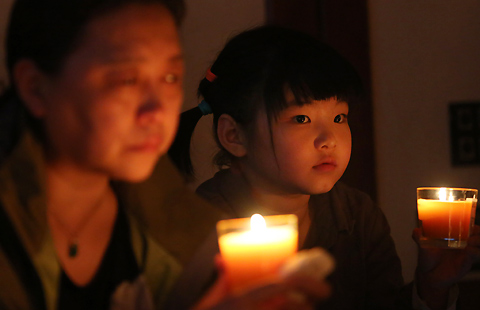
 Vigil marks one month since MH370 vanished
Vigil marks one month since MH370 vanished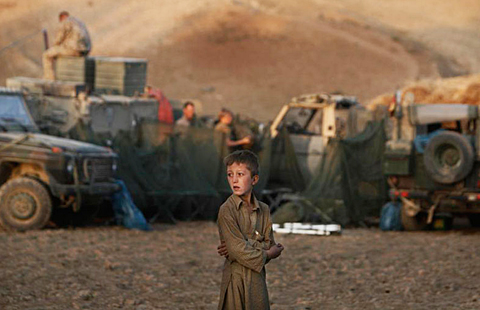
 The world in photos: March 31-April 6
The world in photos: March 31-April 6
 Simply child's play
Simply child's play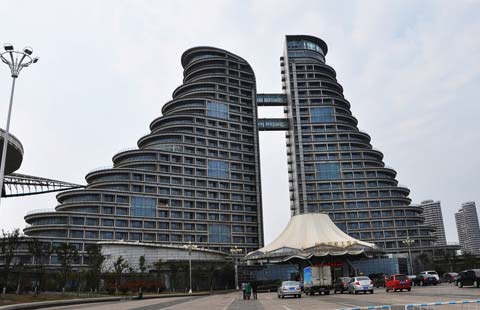
 Photo special: Weird buildings in China
Photo special: Weird buildings in China
 Jackie Chan holds charity concert marking 60th birthday
Jackie Chan holds charity concert marking 60th birthday
 Microsoft to end support for Windows XP
Microsoft to end support for Windows XP
 Poor weather greets baby prince
Poor weather greets baby prince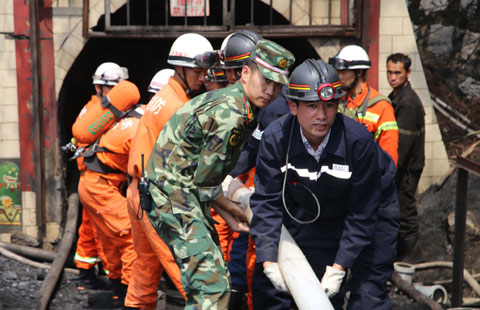
 22 miners trapped in Yunnan coal mine flood
22 miners trapped in Yunnan coal mine flood
Most Viewed
Editor's Picks

|
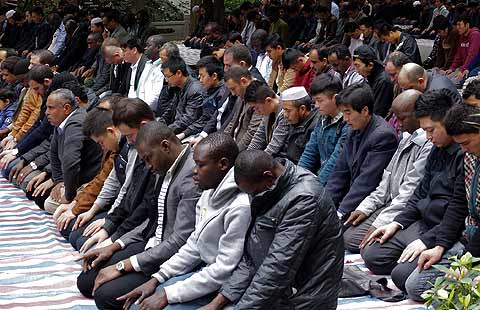
|

|

|

|

|
Today's Top News
Chinese, US defense chiefs begin talks
Time runs short in black box hunt
Hagel's insensible remarks
Media: Japan, US differ in alliance expectations
Pro-Russians declare independence in Donetsk
China tours by Pentagon chiefs
Chinese military institutions visited by US officials
Xinjiang chairman vows to stop religious extremism
US Weekly

|

|
